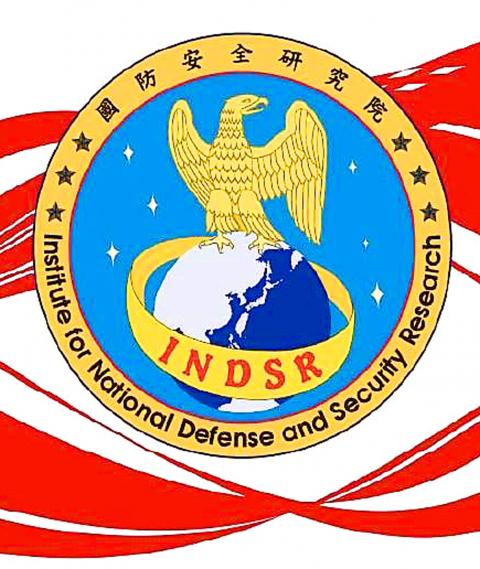China has expanded its propaganda efforts to the cyberspace with the aim of influencing young Taiwanese via emergent media, the Institute of National Defense and Security Research said.
Beijing is using ground and Web-based propaganda to influence Taiwanese, the Ministry of National Defense-affiliated think tank said in the latest issue of its journal, the National Defense and Security Weekly.
Ground-based propaganda refers to China’s efforts to spread its influence at grassroots level by targeting Taiwan’s borough wardens and temples, while Web-based propaganda focuses on infiltrating emergent media, buying Facebook groups and recruiting Internet celebrities, the institute said.

Photo: Tu Chu-min, Taipei Times
For example, a local online job bank in April hired a self-professed “supporter of peaceful unification” to run its political party fan page, showing that China is pushing its agenda strategically and systematically, it said.
Beijing’s so-called 31 measures aimed at attracting Taiwanese businesses and professionals have failed to gain traction, but China is moving beyond them to develop a “united front” in Taiwan by utilizing information technologies that cater to a younger audience, it added.
The China Taiwan Network page under China’s Taiwan Affairs Office Web site has links to a “youth commune” and articles promoting the measures, the journal said, adding that China-based online video streaming service iQiyi (愛奇藝) has partnered with the office.
Beijing’s increased use of emergent media is also evident in the videos on platforms that feature Taiwanese businesspeople and young people espousing pro-China views, it said.
The institute said it believes China uses metadata, artificial intelligence and other technologies to analyze what content young Taiwanese consume and exploit the information to cultivate sympathy for Beijing, it said.
China’s short-term strategy is to mount an interference campaign targeting next year’s presidential election, while its long-term aim is to divide Taiwanese society to facilitate its ultimate goal of annexation, the institute said, citing a National Security Bureau report issued in May.
China is certain to improve the technical sophistication and professionalism of its measures, which would lead to real-time reactions to ongoing events, the institute said.

SECURITY: As China is ‘reshaping’ Hong Kong’s population, Taiwan must raise the eligibility threshold for applications from Hong Kongers, Chiu Chui-cheng said When Hong Kong and Macau citizens apply for residency in Taiwan, it would be under a new category that includes a “national security observation period,” Mainland Affairs Council (MAC) Minister Chiu Chui-cheng (邱垂正) said yesterday. President William Lai (賴清德) on March 13 announced 17 strategies to counter China’s aggression toward Taiwan, including incorporating national security considerations into the review process for residency applications from Hong Kong and Macau citizens. The situation in Hong Kong is constantly changing, Chiu said to media yesterday on the sidelines of the Taipei Technology Run hosted by the Taipei Neihu Technology Park Development Association. With

CARROT AND STICK: While unrelenting in its military threats, China attracted nearly 40,000 Taiwanese to over 400 business events last year Nearly 40,000 Taiwanese last year joined industry events in China, such as conferences and trade fairs, supported by the Chinese government, a study showed yesterday, as Beijing ramps up a charm offensive toward Taipei alongside military pressure. China has long taken a carrot-and-stick approach to Taiwan, threatening it with the prospect of military action while reaching out to those it believes are amenable to Beijing’s point of view. Taiwanese security officials are wary of what they see as Beijing’s influence campaigns to sway public opinion after Taipei and Beijing gradually resumed travel links halted by the COVID-19 pandemic, but the scale of

A US Marine Corps regiment equipped with Naval Strike Missiles (NSM) is set to participate in the upcoming Balikatan 25 exercise in the Luzon Strait, marking the system’s first-ever deployment in the Philippines. US and Philippine officials have separately confirmed that the Navy Marine Expeditionary Ship Interdiction System (NMESIS) — the mobile launch platform for the Naval Strike Missile — would take part in the joint exercise. The missiles are being deployed to “a strategic first island chain chokepoint” in the waters between Taiwan proper and the Philippines, US-based Naval News reported. “The Luzon Strait and Bashi Channel represent a critical access

Pope Francis is be laid to rest on Saturday after lying in state for three days in St Peter’s Basilica, where the faithful are expected to flock to pay their respects to history’s first Latin American pontiff. The cardinals met yesterday in the Vatican’s synod hall to chart the next steps before a conclave begins to choose Francis’ successor, as condolences poured in from around the world. According to current norms, the conclave must begin between May 5 and 10. The cardinals set the funeral for Saturday at 10am in St Peter’s Square, to be celebrated by the dean of the College